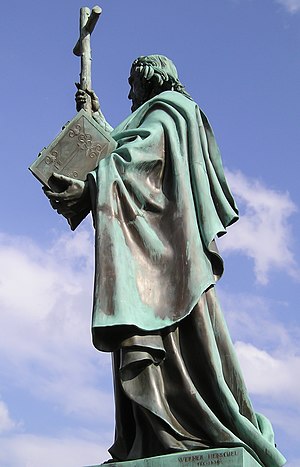
Charles Martel, Martel being a sobriquet in Old French for "The Hammer", was a Frankish political and military leader who, as Duke and Prince of the Franks and Mayor of the Palace to the Merovingian kings of the Franks, was the de facto ruler of the Franks from 718 until his death. He was a son of the Frankish statesman Pepin of Herstal and a noblewoman named Alpaida. Charles successfully asserted his claims to power as successor to his father as the power behind the throne in Frankish politics. Continuing and building on his father's work, he restored centralized government in Francia and began the series of military campaigns that re-established the Franks as the undisputed masters of all Gaul. According to a near-contemporary source, the Liber Historiae Francorum, Charles was "a warrior who was uncommonly ... effective in battle".

Year 714 (DCCXIV) was a common year starting on Monday of the Julian calendar. The denomination 714 for this year has been used since the early medieval period, when the Anno Domini calendar era became the prevalent method in Europe for naming years.
The 740s decade ran from January 1, 740, to December 31, 749.
The 730s decade ran from January 1, 730, to December 31, 739.
The 710s decade ran from January 1, 710, to December 31, 719.
The 700s decade ran from January 1, 700, to December 31, 709.
The 690s decade ran from January 1, 690, to December 31, 699.
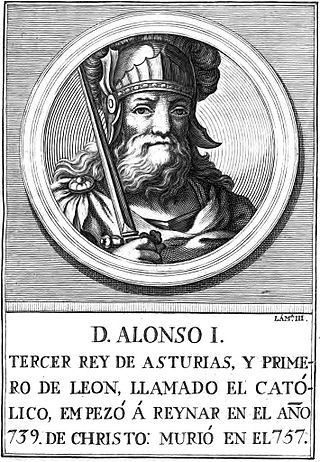
Year 740 (DCCXL) was a leap year starting on Friday of the Julian calendar, the 740th year of the Common Era (CE) and Anno Domini (AD) designations, the 740th year of the 1st millennium, the 40th year of the 8th century, and the 1st year of the 740s decade. The denomination 740 for this year has been used since the early medieval period, when the Anno Domini calendar era became the prevalent method in Europe for naming years.

Year 718 (DCCXVIII) was a common year starting on Saturday of the Julian calendar, the 718th year of the Common Era (CE) and Anno Domini (AD) designations, the 718th year of the 1st millennium, the 18th year of the 8th century, and the 9th year of the 710s decade. The denomination 718 for this year has been used since the early medieval period, when the Anno Domini calendar era became the prevalent method in Europe for naming years.
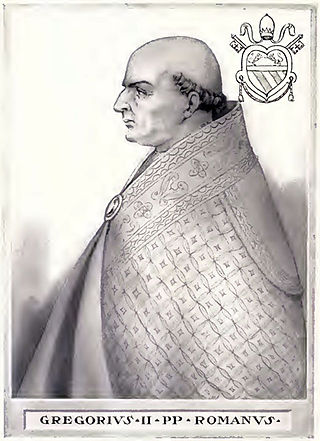
Year 715 (DCCXV) was a common year starting on Tuesday of the Julian calendar. The denomination 715 for this year has been used since the early medieval period, when the Anno Domini calendar era became the prevalent method in Europe for naming years.
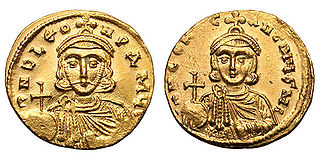
Year 717 (DCCXVII) was a common year starting on Friday of the Julian calendar. The denomination 717 for this year has been used since the early medieval period, when the Anno Domini calendar era became the prevalent method in Europe for naming years.

Year 709 (DCCIX) was a common year starting on Tuesday of the Julian calendar. The denomination 709 for this year has been used since the early medieval period, when the Anno Domini calendar era became the prevalent method in Europe for naming years.
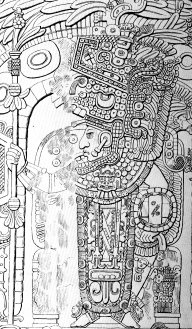
Year 734 (DCCXXXIV) was a common year starting on Friday of the Julian calendar, the 734th year of the Common Era (CE) and Anno Domini (AD) designations, the 734th year of the 1st millennium, the 34th year of the 8th century, and the 5th year of the 730s decade. The denomination 734 for this year has been used since the early medieval period, when the Anno Domini calendar era became the prevalent method in Europe for naming years.

The Carolingian dynasty was a Frankish noble family named after Charles Martel and his grandson Charlemagne, descendants of the Arnulfing and Pippinid clans of the 7th century AD. The dynasty consolidated its power in the 8th century, eventually making the offices of mayor of the palace and dux et princeps Francorum hereditary, and becoming the de facto rulers of the Franks as the real powers behind the Merovingian throne. In 751 the Merovingian dynasty which had ruled the Franks was overthrown with the consent of the Papacy and the aristocracy, and Pepin the Short, son of Martel, was crowned King of the Franks. The Carolingian dynasty reached its peak in 800 with the crowning of Charlemagne as the first Emperor of the Romans in the West in over three centuries. Nearly every monarch of France from Charlemagne's son Louis the Pious till the penultimate monarch of France Louis Philippe have been his descendants. His death in 814 began an extended period of fragmentation of the Carolingian Empire and decline that would eventually lead to the evolution of the Kingdom of France and the Holy Roman Empire.

Chilperic II was king of the Franks from 715 until his death.
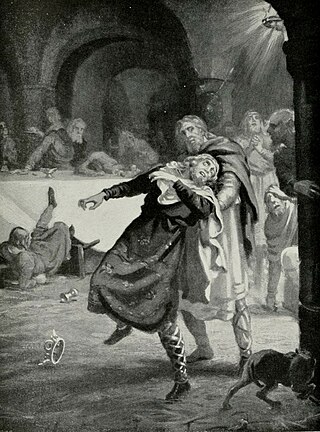
Ceolred was king of Mercia from 709 to 716.
Ragenfrid was the mayor of the palace of Neustria and Burgundy from 715, when he filled the vacuum in Neustria caused by the death of Pepin of Heristal, until 718, when Charles Martel finally established himself over the whole Frankish kingdom.
The Battle of Amblève took place in 716 near Amel. The mayor of the palace of Austrasia, Charles Martel, defeated his Neustrian and Frisian rivals who were led by King Chilperic II, his mayor Ragenfrid, and Redbad, King of the Frisians. It was the first major victory of Martel in a long career of victories. In this battle Martel began demonstrating the military genius which would mark the remainder of his life.
The Battle of Cologne was fought near the city of Köln in the year 716 AD. The battle is known chiefly as the first battle of Charles Martel's command and is the only defeat of his life.

